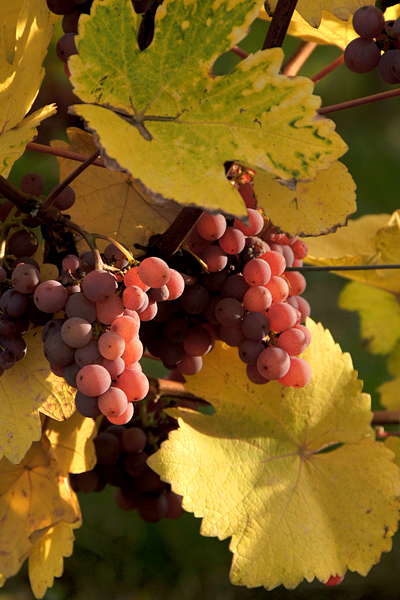
"Autumn came, dyed with the trodden grapes:
The wine, justly owed to Jupiter, was paid.
So the day is called the Vinalia: Jupiter claims it,
And loves to be present at his feast."Ovid, Fasti (IV.897ff)
Three seasons were regarded as potentially threatening to crops, each recognized by its own festival—the Robigalia, Floralia, and Vinalia (Pliny, XVIII.284). Two celebrated the vine: the Vinalia urbana (priora) and the Vinalia rustica. The principal festival was the Vinalia Priora, celebrated on April 23, when the casks that had been filled the preceding autumn were opened and, after a libation offered to Jupiter, the wine tasted for the first time (Pliny, XVIII.287). The Vinalia Rustica (which must have been observed more keenly in the country than the city) was celebrated on August 19, as the grape harvest approached, again with prayers and an offering to Jupiter. The god was propitiated by the sacrifice of a lamb in expectation of the storms that marked the beginning of autumn, but not before the priest had picked a cluster of grapes, thus commencing the new vintage (Varro, On the Latin Language, VI.16; Pliny, XVIII.294). Verrius Flaccus says it was with this proclamation that new wine could be brought into Rome, although it is more likely that the April celebration was when wine from the previous year's harvest could be brought to market.

Later, April 23 came to be associated with Venus. Varro, who is quite definitive in saying that the day belonged to Jupiter, not Venus (On the Latin Language, VI.16; Macrobius, Saturnalia, I.4.6) also declares that it is Venus who protects the garden and "in her honour the rustic Vinalia has been established" (On Agriculture, I.6). There is some uncertainty in Ovid, as well, who, after attributing the festival to Venus, then relates its legendary origin. If given the next vintage, Mezentius, the tyrant king of the Tyrrhenians (Etruscans), will aid Turnus, king of the Rutuli, in his war with Aeneas. Aeneas promises Jupiter a tribute from Latium's own vines. The hero is victorious and Ovid's poem concludes with the lines quoted above.
Plutarch asks why a quantity of wine was poured from the Temple of Venus on the festival of the Veneralia (which he confuses with the Vinalia), and answers the question with the story of Mezentius, who offered peace if sent the year's vintage. When Aeneas refuses, he vows to take it in war. Aeneas then consecrated the wine to the gods and, when he himself was victorious, poured all of it out in front of the temple (Roman Questions, XLV).
"You prostitutes, celebrate the divine power of Venus:
Venus suits those who earn by your profession.
Offer incense and pray for beauty and men’s favour,
Pray to be charming, and blessed with witty words,
Give the Mistress myrtle, and the mint she loves,
And sheaves of rushes, wound in clustered roses.
Now’s the time to crowd her temple near the Colline Gate."
Ovid, Fasti (IV.865ff)
A Temple to Venus Erucina had been dedicated outside the city walls in 181 BC on April 23, the day of the Vinalia, when prostitutes sacrificed to the goddess. Respectable women worshipped on the Capitoline. Apparently, such gifts continued the next day, as the Praeneste calendar notes that the 25th was a holiday for bawds and the preceding day, one for prostitutes (meretrices, the last word in the detail above).
The picture, taken in October, is of grapes in the Alsace, ripening later than they would in Italy. The detail is from the Fasti Praenestini, which is in the Palazzo Massimo Alle Terme (Rome). IX Kal. Mai. (April 23) marks the date of the Vinalia. The translation of Ovid is by A. S. Kline.